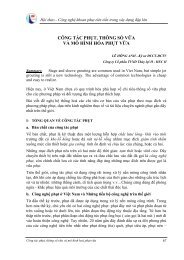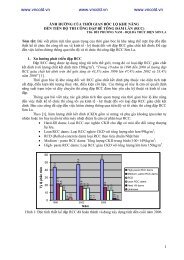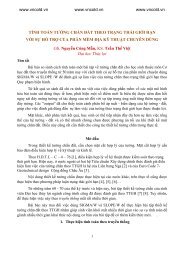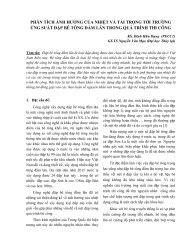Civil Engineering Project Management (4th Edition)
Create successful ePaper yourself
Turn your PDF publications into a flip-book with our unique Google optimized e-Paper software.
construction, so that they can plan their tendering work and consider their<br />
response to other opportunities.<br />
6.4 Requirements for fast completion<br />
There is a widespread tendency for employers to want their civil engineering<br />
works designed and built in the shortest possible time. This pressure for speed<br />
often arises because of the time it nowadays may take for an employer to gain<br />
powers to construct his works. He may need to get planning consents, satisfy<br />
conservation and environmental interests, acquire land and wayleave rights,<br />
accommodate objectors and go through the lengthy process of a public inquiry.<br />
The funding of international projects may also take some years to arrange and<br />
negotiate. Commercial organizations tend to delay a project, then want it completed<br />
as fast as possible when market conditions are right. None of this can be<br />
avoided; but the pressure to undertake both design and construction in excessive<br />
haste needs to be resisted.<br />
Starting construction before designs are complete or before the employer<br />
is sure what he wants, is a major cause of constructional problems, claims by<br />
contractors and of costs grossly exceeding original estimates. Hurriedly prepared<br />
documents, contract drawings incomplete before tendering, tender<br />
periods too short and an employer who wants changes after construction has<br />
started, can lead to a legion of unforeseen problems, forced changes of design,<br />
multiple claims from a contractor and a job not completed any earlier than it<br />
would have been had proper time been allowed to get everything right before<br />
calling for tenders.<br />
The three outstanding requirements for fast completion of construction are:<br />
• designs fully complete before tenders are called for;<br />
• adequate tendering time for tenderers to prepare their bids;<br />
• an employer who makes no substantial changes to his requirements after<br />
construction has started.<br />
Given good designs based on adequate site investigations, drawings providing<br />
all the details a contractor needs, and no changes during construction, any<br />
competent and well-organized contractor can give fast construction. He can<br />
also give a good job. The quality of a job is all-important to a contractor’s reputation.<br />
The cost of a job and how long it took may fade from an employer’s<br />
memory; but, if the job is a poor one giving a series of after-troubles, it will be<br />
a continuing source of dissatisfaction to the employer, which he will not forget.<br />
6.5 Issuing tender documents<br />
Tendering 69<br />
Tender preparation and assessment times need to be adequate; they should<br />
be programmed into a realistic timetable which gives sufficient time for the


















